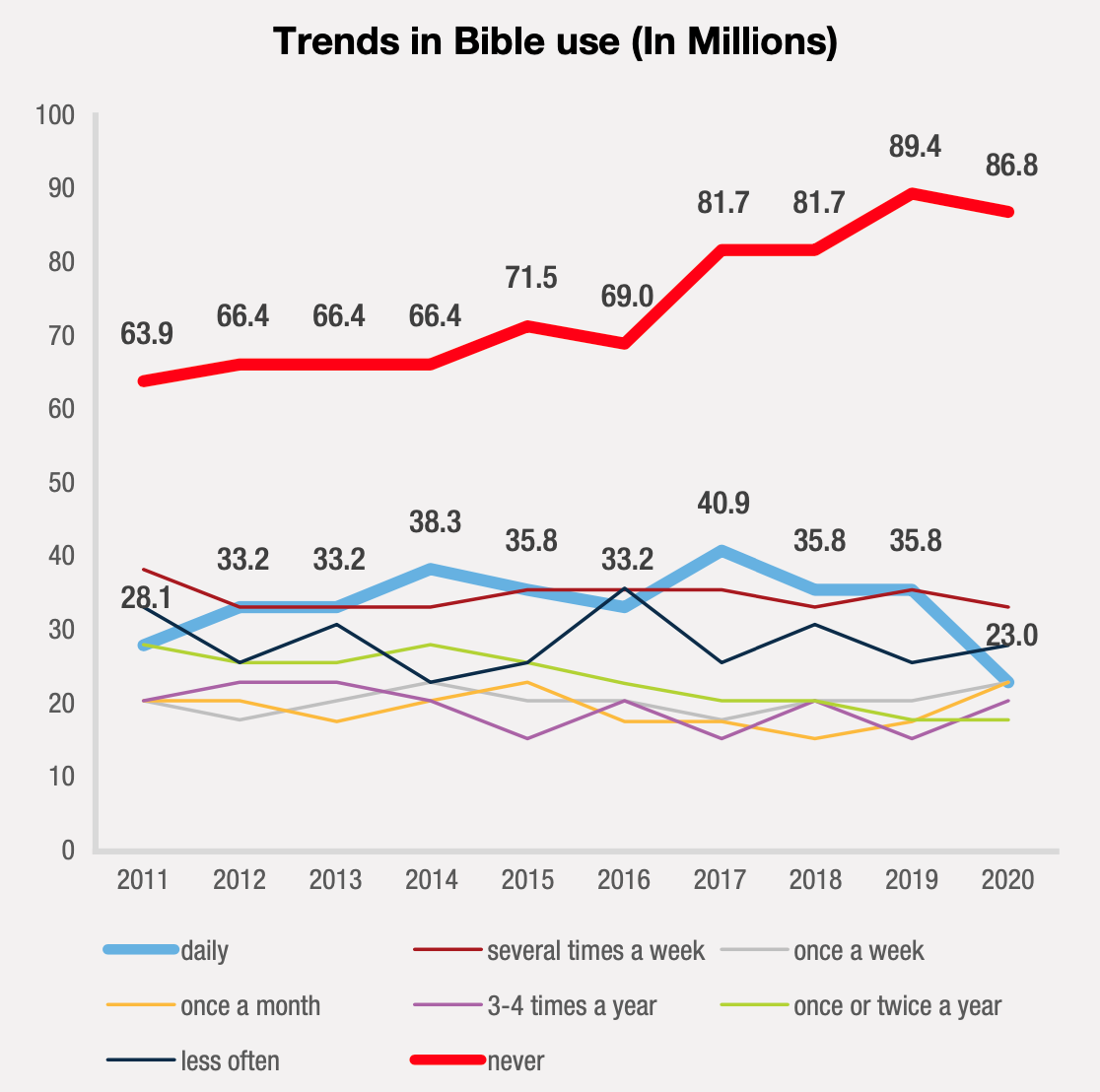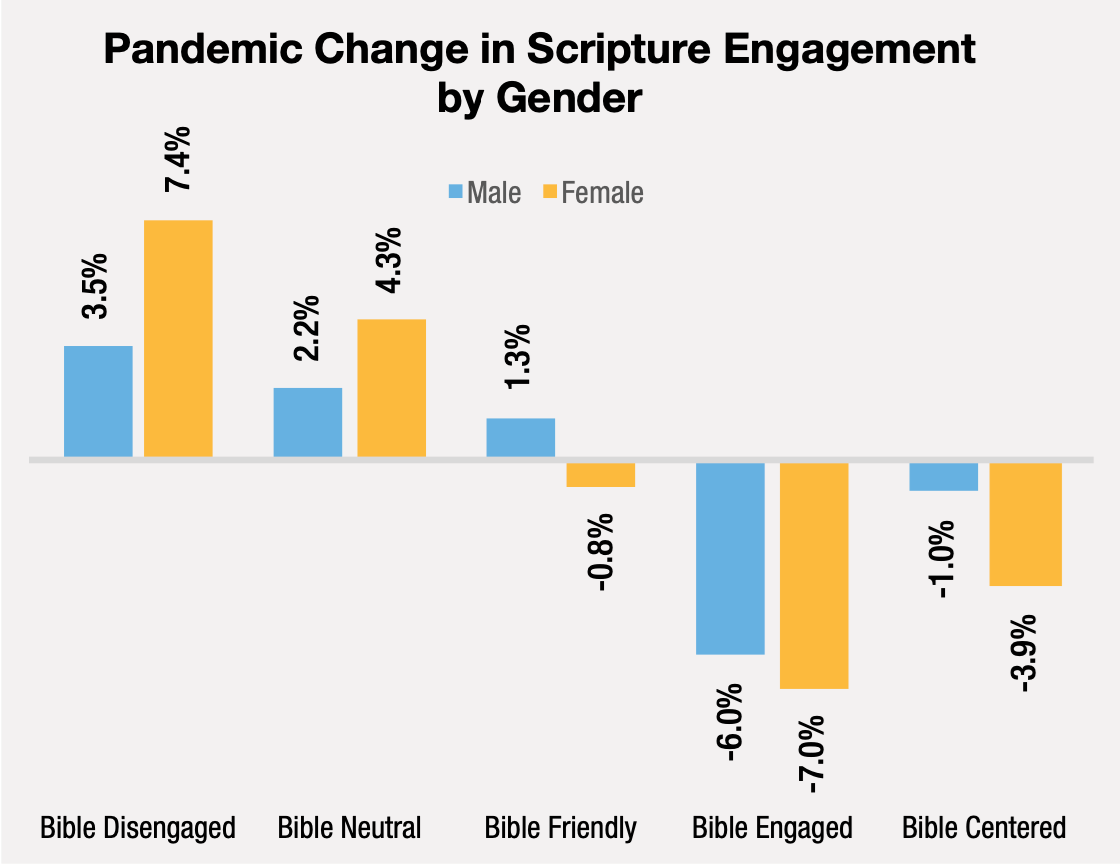Barna - Do Christians Read Teh Bible
The COVID-19 pandemic is shifting Americans' Bible engagement, with many who are socially distanced from their spiritual communities turning to Scripture less and those who have lost loved ones to the virus reading it more.
Between early on 2019 and 2020, the pct of Us adults who say they use the Bible daily dropped from 14 percent to 9 percent, according to the State of the Bible 2020 report released today by the Barna Grouping and the American Bible Society (ABS).
A decrease of v percentage points in a single year was unprecedented in the annual survey's 10-year history; between 2011 and 2019, daily Bible readers had basically held steady at an boilerplate of 13.7 pct of the population.
But the decline continued during the initial months of the coronavirus pandemic, and by June, the pct of daily Bible users had dropped to 8.v per centum.
Amid the pandemic, a larger decline occurred amidst the Americans who say their choices and relationships are shaped by the Bible, a grouping ABS calls "Bible engaged." In Jan, 27.8 percent of American adults were Bible engaged. By June, after months of quarantine and church closures, that effigy was down to 22.six percent.
"This study supports the idea that the church plays a significant role in benefitting people's wellbeing and Scripture engagement," said John Farquhar Plake, ABS director of ministry intelligence. "To increase Scripture engagement, we must increase relational connections with i some other through the church. The pandemic—and now this survey—have shown that when relational church engagement goes upwardly, so does Scripture appointment, merely when it goes downward, Scripture appointment drops with it."

Prototype: Country of the Bible 2020 / ABS and Barna Grouping
Overall, nigh a 5th (22%) of US adults interact with the Bible multiple times a week, not counting Scripture utilize at church, according to a January survey. More a 3rd (35%) of Americans say they never read the Bible—unchanged from concluding twelvemonth only up from 25 percent at the annual study's inception in 2011. Lx percent read the Bible iv times per year or less.
In January, women were slightly more Bible engaged than men (19.1% vs. 18.viii%) and 2 percent more likely than men to be "Bible centered" (a Barna and ABS designation for individuals with the highest level of influence from Scripture in their daily lives).
Only that changed when the pandemic striking. Women lost more basis than men in Bible engagement, and levels of date evened out among the genders for the offset time in the survey's history. Women'southward Bible engagement dropped by vii percentage points between Jan and June, compared with 6 percentage points for men. The number of women considered "Bible centered" in January dropped past 3.9 points past June compared with i indicate for men.

Image: State of the Bible 2020 / ABS and Barna Group
The drop could be related to life adjustments women were forced to brand as they juggled work from home and caring for children who previously attended school or daycare, the report speculated. A lack of in-person connection with churches and small groups also could have played a office, according to the written report.
"You can't download a hug," said Donald Whitney, professor of biblical spirituality at the Southern Baptist Theological Seminary. Lack of encouragement from "concrete presence" with other believers "can diminish our engagement in the spiritual disciplines because when we're together, we're encouraged to stay faithful to the things of God."
One manner to reengage with Scripture is by meditating on information technology, said Whitney author of Spiritual Disciplines for the Christian Life. Christians should "read big, meditate small," he said, reading a larger passage and so spending a few minutes thinking about one poetry or phrase. Praying the passage and coming up with an analogy are ii ways of mediating suggested by Whitney.
Measuring the pandemic's touch on on American spirituality was a major reason ABS supplemented its January survey of 2,010 people, conducted alongside Barna, with a June poll of three,020 Americans. The pandemic doesn't seem to accept changed the overall pct of Bible readers, co-ordinate to the follow-up report, but Americans who lost loved ones to COVID-xix were more probable to increase their Bible use.
About half (49%) of Americans with a family member living in their household who died of coronavirus said they increased their use of the Bible—2.3 times more than than average. Thirty-half dozen percent of those with a neighbor who died of the virus increased their Bible use (i.vii times more than boilerplate), and 33 percent of those with a shut personal friend who died increased their apply (1.6 times more than boilerplate).
When the pandemic hit in March, there were initial signs it might be having an overall positive effect on American spirituality. Iii of the largest online evangelism ministries—Global Media Outreach, the Billy Graham Evangelistic Association, and Cru—all reported increases of people seeking online information virtually knowing Jesus. The spike in marvel was corroborated past ABS, which constitute more Americans exploring the Bible for the first time in June than January.
But obviously the spike in marvel didn't translate into engagement. In June thirteen.i meg fewer Americans were Bible engaged than in January. Within that overall decrease, the "Bible centered" segment was about impacted, decreasing by 9.seven 1000000.
Church closures during the pandemic probable impacted the decrease in Bible engagement, according to ABS.
"Faith communities take demonstrated incredible resilience, innovation, and empathy through the pandemic," ABS president and CEO Robert Briggs said. "But this survey reveals that a big opportunity still remains for Christian organizations to brand an impact on Scripture engagement."
During the pandemic-necessitated lockdown, 48 pct of practicing Christians met almost with their churches using a streaming service that immune them to watch but not exist seen or heard, according to ABS, and 14 per centum did non participate in any Christian church services.
Chris Hall, president of the spiritual germination ministry Renovaré, said disruption of life rhythms likely injure Bible engagement. Prolonged stress likewise could have affected Christians' power to assimilate and alive out Scripture, he said.
To counter a pandemic-prompted morass in Bible appointment, Hall said, "learn to read the Bible in a new way." That could include using a Bible app that plays music as a person reads or a Bible app that reads a selected passage aloud over and over.
"Think about the possibilities that the pandemic is offering," he said, "rather than simply what is negative."
The annual report also showed that millennials read the Bible more than frequently than any other generation, with 26 percent reading it multiple times each calendar week. That'south consequent with previous findings that practicing Christian millennials know the Bible as well equally or ameliorate than their parents and grandparents. Adults aged 74 and up are the least likely age group to read their Bibles multiple times each week, with only 10 percent doing so.
While virtually Bible readers (65%) adopt a printed version, millennials are about as probable to read the Bible digitally (52%) as they are in print (48%). Americans who live in a household that owns a Bible (77% of the population) are as likely to use a Bible app as those without a Bible in the house (56% vs. 55%).
African Americans have the highest level of Scripture engagement among racial groups in America, some other finding consistent with longstanding trends. Some 27 per centum of African Americans are Bible engaged, compared with 24 percent of Hispanics, 18 percent of Asians, and 17 percent of Anglos.
ABS plans to publish additional analysis of Americans' Bible appointment each month between August and December.
David Roach is a author in Nashville.
Source: https://www.christianitytoday.com/news/2020/july/state-of-bible-reading-coronavirus-barna-abs.html
Post a Comment for "Barna - Do Christians Read Teh Bible"